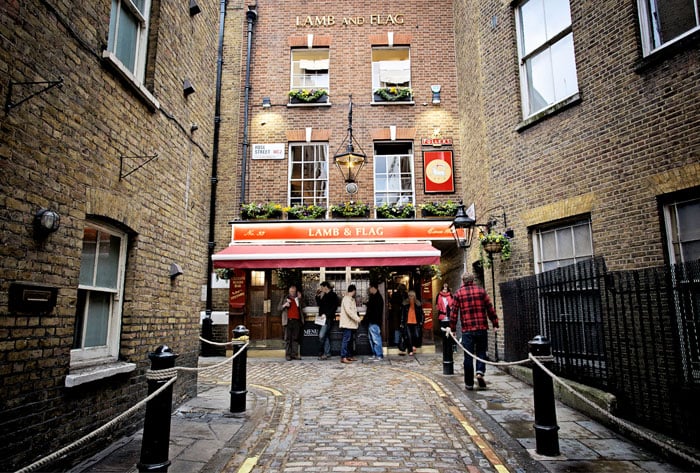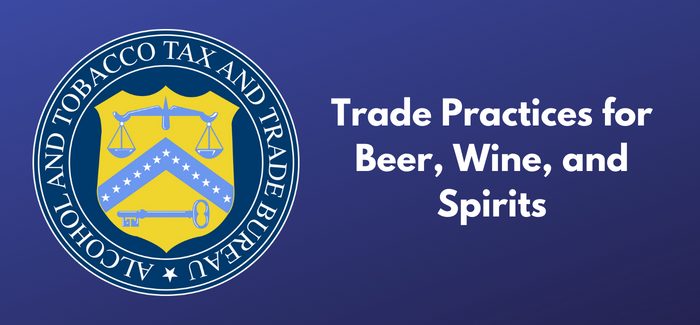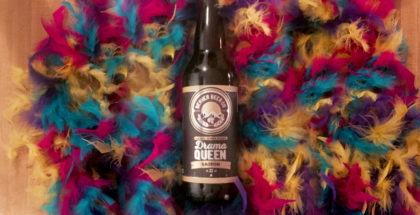The TTB Wants Your Feedback About Unfair Trade Practices
Back in July of 2021, the Biden Administration issued Executive Order 14036, addressing competition in the beer, wine and spirits industry. The goal of the executive order is to uncover the challenges that suppliers face in entering the industry. After an extensive request for information (RFI) period open to the general public and industry members alike, the Alcohol and Tobacco Tax and Trade Bureau (TTB), Federal Trade Commission, Secretary of the Treasury, and the Attorney General of the United States determined that unlawful trade practices need to be a more prominent focus for lawmakers if they want to level the playing field for new and existing beverage brands.
TTB regulations regarding trade practices have not been revised in over 20 years and so, again, the bureau is turning to the community for commentary about current market conditions to guide its efforts in reforming policies that could remove barriers to entry and encourage healthier competition in the beverage alcohol space. More specifically, the new RFI focuses on regulations that govern the Federal Alcohol Administration Act’s stance on exclusive outlets, consignment sales, commercial bribery and tied house business structures. In recognition that current regulations might not be sufficient for modern marketplace conditions, the TTB is requesting public input.
Read on to better understand the legalese within the RFI and how to provide feedback.
Trade Practices
The Federal Alcohol Administration Act strictly prohibits producers, wholesalers and importers from engaging in activities that might threaten the independence of retailers and/or give industry members an unfair advantage over others. These activities are also known as “trade practices” and include exclusive outlets, tied house, commercial bribery and consignment sale tactics.
“Exclusive outlet” regulations make it unlawful for any industry member to require retailers to buy, or not buy, other brands. Out in the trade, this is referred to as brand exclusivity and unfortunately is a common occurrence among suppliers and wholesalers. Ever been to a sporting event where beverage menus are full of only specific brands? That’s an example of a potential exclusive outlet agreement. Chances are there are other brands available somewhere in that facility that help the supplier avoid litigation, but to the general public, the readily accessible brand choices are limited. Most exclusive outlet agreements are verbal to avoid a paper trail.
Closely related to exclusivity agreements is the “tied house” concept, which is illegal in the United States but widely practiced in international markets. Tied house laws prohibit any retailer from adopting an exclusive outlet sales structure by being directly involved with its business practices. This could mean that a supplier helped pay for the retailer’s liquor license, provided them with real estate, assisted with advertising costs, furnished equipment or maintenance services, contributed signage or display materials, guaranteed a loan, extended credit agreements, or asked them to dispose of the product.

“Commercial bribery“ regulations are defined exactly as they sound. They prohibit industry members from enticing retailers and/or wholesalers with monetary payments or other types of compensation and/or rewards for purchasing their products instead of other brands. In trade, such activities are also known as incentives and are common. Incentives are typically voluntary, so they usually get swept under the rug as an accepted trade practice, but they can seriously hinder sales for many brands that can’t afford to offer rewards in exchange for incremental sales. Ever heard of category management, distributor sales incentives or retail staff sales contests? They’re all forms of commercial bribery and violate TTB trade practice regulations.
“Consignment sale” regulations prohibit any industry member from orchestrating conditional sales agreements for their products with wholesalers or retailers. This type of agreement usually involves terms for product returns or staggered payment arrangements of some kind.
Requested Commentary
Industry members have until March 2023 to submit commentary to the TTB’s Request For Information about unlawful trade practices. The bureau is asking three specific questions of the public:
- How can the TTB update trade practice regulations to fully encompass modern marketplace conditions?
- How might the TTB update trade practice regulations to expand its scope of exclusionary market activities?
- How can the TTB carry over trade practice regulations to the digital marketplace?
Read the full list of questions.
In addition to the exploratory questions, the TTB has also requested feedback about the following topics of interest.
- Category management, which commonly occurs in the off-premise market segment when selling one’s products into large retail outlets.
- Shelf plans or schematics, which represent additional value for off-premise retail buyers, are often provided by large brands in order to secure additional shelf space at the expense of smaller, independent brands.
- Slotting allowances (or fees), which are monetary or value-laden enticements provided by a producer in order for retailers to reward that brand with favorable placement in their establishments (includes ideal shelf placement, tap lines, displays, etc.).
- Interest in a retail property or license, specifically in regards to crowdfunding, that would result in inducements and violate tied house laws.
- How tied house laws apply to third-party fulfillment services or companies.
- Updates to the usage and monetary caps on point-of-sale or display materials by producers.
- Updates to 30-day credit term extensions for retailers and safe harbor regulations.
- Updates to the definition of trade buyer specifically in regard to importers.
- How private label arrangements between suppliers and retailers violate tied house laws.
- Brand-sharing arrangements where suppliers share a name with a retail establishment.
- Exclusionary practices in regard to brand sponsorships of sporting venues, event facilities, etc.
- Trade practices that need to be further defined for new retail outlets to protect their independence, including third-party contracts.
- Commercial bribery practices in the form of sales contests or competitions.
Speaking Up
The bureau invites commentary from the public, individuals within the beverage industry, businesses and trade organizations. Responses can be anonymous or publicly self-disclosed, so the feedback should get interesting. Industry members are often not eager to blow the whistle on unfair trade practices but, behind closed doors, there is no shortage of heated opinions about bribery, incentives, sideways business deals, category management, slotting fees, expensive displays, donated equipment and exclusionary partnerships. At a time when over 1 million items are available for sale in just the beer space alone (Alworth, Beervana June 2022), some could argue that competition is healthy and thriving, but the modern beverage alcohol landscape is a cautionary tale of the haves and the have-nots. Large national brands have the resources to sustain unfair trade practices, including legal counsel that assists in avoiding litigation and ample financial resources to cover incremental fines for violations. On the flip side, smaller independent brands want to fight back against unlawful trade practices but, at the same time, are always searching for new, innovative ways to grow their brands. Glaringly missing from trade practice regulations are penalties for retailers when they agree to unlawful terms of sale. So here we are at our Catch-22: It’s a big risk to speak up about trade practice modernization because then your brand or business is under the microscope, but the industry cannot progress if everyone keeps their mouth shut.








Submit a Comment